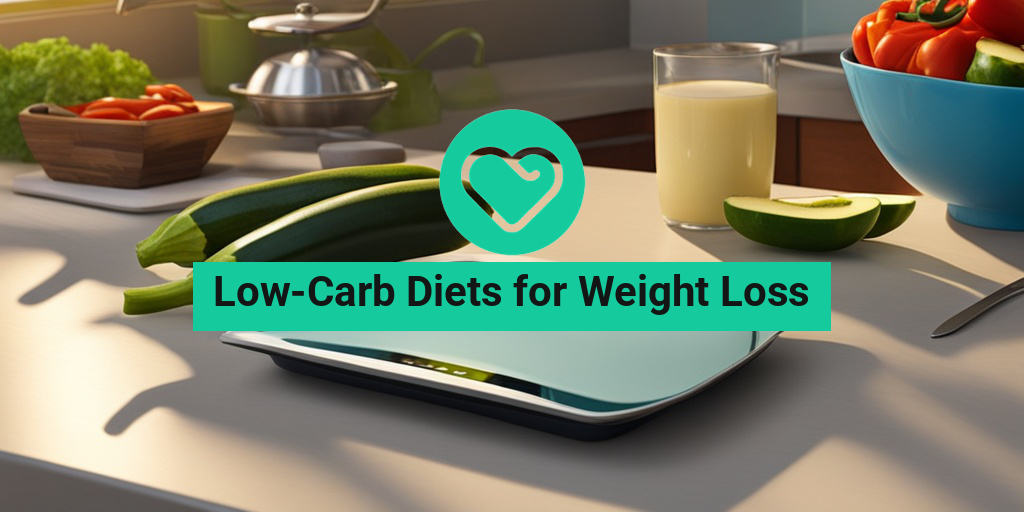“`html
What Are Low-Carb Diets?
A low-carb diet is a dietary approach that restricts carbohydrate intake, focusing instead on consuming proteins and fats. This type of diet has gained popularity for its potential to aid in weight loss and improve overall health. By limiting carbohydrates, the body is encouraged to enter a state of ketosis, where it burns fat for fuel instead of glucose derived from carbs.
Types of Low-Carb Diets
There are several variations of low-carb diets, each with its own set of guidelines:
- Keto Diet: Extremely low in carbs (usually under 20 grams per day), high in fats, and moderate in protein.
- Atkins Diet: A phased approach that gradually increases carb intake after initial weight loss.
- Paleo Diet: Focuses on whole foods, eliminating processed foods, grains, and legumes.
- South Beach Diet: A balanced approach that emphasizes healthy fats and lean proteins while limiting refined carbs.
How Low-Carb Diets Work
When you reduce your carbohydrate intake, your body begins to use stored fat for energy, leading to weight loss. This metabolic shift can also help regulate insulin levels, which is beneficial for those with insulin resistance or type 2 diabetes. By focusing on low-carb foods for weight loss, you can enjoy a variety of delicious meals while still achieving your health goals.
Benefits of Low-Carb Diets
Low-carb diets offer numerous benefits beyond just weight loss. Here are some of the most notable advantages:
1. Effective Weight Loss
Many people find that low-carb diets for weight loss are more effective than traditional calorie-restricted diets. By reducing carbs, you can decrease hunger and cravings, making it easier to stick to your eating plan. Studies have shown that individuals on low-carb diets often lose more weight in the initial stages compared to those on low-fat diets.
2. Improved Blood Sugar Control
Low-carb diets can significantly improve blood sugar levels and insulin sensitivity. This is particularly beneficial for individuals with type 2 diabetes or prediabetes. By minimizing carbohydrate intake, you can help stabilize blood sugar levels and reduce the risk of complications associated with diabetes.
3. Enhanced Mental Clarity
Many people report improved focus and mental clarity when following a low-carb diet. This may be due to the brain using ketones (produced from fat) as an alternative energy source, which can lead to enhanced cognitive function.
4. Increased Energy Levels
Once your body adapts to burning fat for fuel, you may experience increased energy levels throughout the day. This can lead to improved physical performance and endurance, making it easier to engage in regular exercise.
5. Heart Health Benefits
Low-carb diets can improve several risk factors for heart disease, including lowering triglycerides and increasing HDL (good) cholesterol levels. By focusing on healthy fats and lean proteins, you can support your cardiovascular health while losing weight.
6. Reduced Hunger and Cravings
One of the most significant benefits of low-carb diets is the reduction in hunger and cravings. High-protein and high-fat foods tend to be more satiating, which can help you feel full longer and reduce the likelihood of overeating.
7. Flexibility in Meal Planning
With a wide variety of low-carb foods for weight loss, meal planning can be both enjoyable and flexible. From delicious low-carb fruits to satisfying low-carb meals, there are countless options to keep your diet interesting and satisfying. For recipe ideas, you can explore resources like Yesil Health AI for evidence-based health answers and meal suggestions.
In conclusion, low-carb diets for weight loss can be an effective and sustainable approach to achieving your health goals. With numerous benefits ranging from improved blood sugar control to increased energy levels, it’s no wonder that many people are turning to this dietary strategy. If you’re considering a low-carb diet, consult with a healthcare professional to ensure it’s the right fit for you. 🌟
“`

“`html
Low-Carb Diets vs. Other Diets
When it comes to weight loss, there are countless diets to choose from, each with its own set of rules and philosophies. Among these, low-carb diets for weight loss have gained significant popularity. But how do they stack up against other dietary approaches? Let’s explore the differences and benefits of low-carb diets compared to other common diets.
Understanding Low-Carb Diets
A low-carb diet typically restricts carbohydrate intake in favor of protein and fats. The idea is to reduce insulin levels, which can help the body burn fat more effectively. Common low-carb diets include the ketogenic diet, Atkins, and Paleo. These diets emphasize whole foods and often lead to rapid weight loss, especially in the initial stages.
Low-Carb vs. Low-Fat Diets
One of the most traditional approaches to weight loss is the low-fat diet. This diet focuses on reducing fat intake, often leading to higher carbohydrate consumption. Here’s how they compare:
- Weight Loss Speed: Low-carb diets often result in quicker initial weight loss due to water weight loss and reduced insulin levels.
- Sustainability: Many find low-carb diets easier to stick to because they can eat satisfying foods like meats and cheeses, while low-fat diets may leave some feeling deprived.
- Health Benefits: Low-carb diets have been linked to improved blood sugar control and reduced triglycerides, while low-fat diets may not offer the same metabolic benefits.
Low-Carb vs. Mediterranean Diet
The Mediterranean diet emphasizes whole grains, fruits, vegetables, and healthy fats, particularly olive oil. While it’s considered one of the healthiest diets, it differs significantly from low-carb diets:
- Carbohydrate Sources: The Mediterranean diet includes whole grains and legumes, which are higher in carbs compared to low-carb diets.
- Flexibility: The Mediterranean diet allows for a wider variety of foods, making it more flexible for some individuals.
- Heart Health: Both diets can promote heart health, but the Mediterranean diet is particularly noted for its cardiovascular benefits.
Low-Carb vs. Intermittent Fasting
Intermittent fasting is another popular weight loss strategy that focuses on when you eat rather than what you eat. Here’s how it compares to low-carb diets:
- Focus: Low-carb diets focus on macronutrient composition, while intermittent fasting focuses on meal timing.
- Weight Loss Mechanism: Both can lead to weight loss, but low-carb diets may provide quicker results due to reduced insulin levels and appetite suppression.
- Ease of Implementation: Some may find intermittent fasting easier to follow, as it doesn’t require strict food restrictions.
Common Low-Carb Diet Plans
If you’re considering a low-carb diet for weight loss, there are several popular plans to choose from. Each has its unique approach and guidelines, making it essential to find one that fits your lifestyle and preferences.
The Ketogenic Diet
The ketogenic diet is one of the most well-known low-carb diets. It typically involves consuming about 70% fats, 25% protein, and only 5% carbohydrates. This drastic reduction in carbs puts the body into a state of ketosis, where it burns fat for fuel instead of glucose. Many people experience significant weight loss and increased energy levels on this diet.
The Atkins Diet
The Atkins diet is a phased approach to low-carb eating. It starts with a very low carbohydrate intake and gradually increases it as you progress through the phases. This diet emphasizes protein and healthy fats, allowing for a variety of foods while promoting weight loss.
The Paleo Diet
The Paleo diet encourages eating like our ancestors by focusing on whole, unprocessed foods. This means no grains, legumes, or dairy, which naturally leads to a lower carbohydrate intake. The emphasis is on meats, fish, fruits, vegetables, nuts, and seeds, making it a popular choice for those looking to lose weight while eating nutrient-dense foods.
The South Beach Diet
The South Beach diet is a modified low-carb diet that focuses on the quality of carbohydrates rather than just the quantity. It encourages the consumption of healthy fats and lean proteins while limiting refined carbs and sugars. This diet is divided into phases, allowing for a gradual introduction of healthy carbs.
In conclusion, low-carb diets offer a variety of options for those looking to lose weight. By understanding how they compare to other diets and exploring common low-carb plans, you can make an informed decision that aligns with your health goals. 🌟
“`

“`html
Low-Carb Foods to Include
When embarking on a low-carb diet for weight loss, it’s essential to know which foods to include in your meal plan. These foods not only help you reduce your carbohydrate intake but also provide essential nutrients that support overall health. Here’s a comprehensive list of low-carb foods for weight loss that you can incorporate into your daily meals:
1. Lean Proteins
- Chicken Breast: A versatile protein source that can be grilled, baked, or stir-fried.
- Fish: Salmon, mackerel, and sardines are rich in omega-3 fatty acids and low in carbs.
- Eggs: Packed with protein and healthy fats, eggs are a staple in many low-carb diets.
2. Non-Starchy Vegetables
Vegetables are crucial for a balanced diet. Focus on non-starchy options such as:
- Spinach: Low in carbs and high in iron and vitamins.
- Broccoli: A fiber-rich vegetable that can be steamed or roasted.
- Zucchini: Great for making low-carb noodles or adding to stir-fries.
3. Healthy Fats
Incorporating healthy fats can help you feel full and satisfied. Consider adding:
- Avocado: A creamy fruit that’s rich in monounsaturated fats.
- Olive Oil: Perfect for salad dressings or cooking.
- Nuts and Seeds: Almonds, walnuts, and chia seeds are excellent snacks that provide healthy fats and protein.
4. Low-Carb Fruits
While many fruits are high in sugar, there are some low-carb options that can be enjoyed in moderation:
- Berries: Strawberries, blueberries, and raspberries are lower in carbs compared to other fruits.
- Melons: Watermelon and cantaloupe can be refreshing and hydrating choices.
5. Dairy Products
Full-fat dairy products can be a great addition to a low-carb diet:
- Greek Yogurt: Opt for unsweetened varieties to keep carbs low.
- Cheese: Cheddar, mozzarella, and cream cheese are all low in carbs and high in flavor.
Potential Side Effects
While low-carb diets for weight loss can be effective, they may also come with some potential side effects, especially during the initial transition period. Here are some common issues you might encounter:
1. Keto Flu
As your body adjusts to a lower carbohydrate intake, you may experience symptoms similar to the flu, often referred to as the keto flu. Symptoms can include:
- Fatigue
- Headaches
- Nausea
- Dizziness
These symptoms typically subside within a few days to a week as your body adapts to burning fat for fuel instead of carbohydrates.
2. Digestive Issues
Some individuals may experience digestive discomfort, such as constipation or diarrhea, when starting a low-carb diet. This can be due to a sudden decrease in fiber intake. To mitigate this, ensure you are consuming plenty of non-starchy vegetables and consider adding fiber supplements if necessary.
3. Nutrient Deficiencies
Restricting carbohydrates can lead to potential nutrient deficiencies if not carefully planned. It’s crucial to include a variety of foods in your diet to ensure you are getting all the necessary vitamins and minerals. Consider consulting with a healthcare professional or a registered dietitian to create a balanced meal plan.
4. Bad Breath
Some people on a low-carb diet may notice a change in their breath, often described as fruity or metallic. This is a result of the body producing ketones, which are a byproduct of fat metabolism. Staying hydrated and maintaining good oral hygiene can help alleviate this issue.
5. Mood Swings
As your body adjusts to a lower carbohydrate intake, you may experience mood swings or irritability. This is often temporary and can improve as your body becomes accustomed to the new diet. Ensuring you are consuming enough healthy fats and proteins can help stabilize your mood.
In conclusion, while low-carb diets for weight loss can offer numerous benefits, it’s essential to be aware of potential side effects and plan your meals carefully to ensure a balanced intake of nutrients. 🌟
“`

“`html
Tips for Success
Embarking on a low-carb diet for weight loss can be a transformative journey, but like any lifestyle change, it requires commitment and strategy. Here are some essential tips to help you succeed:
1. Start with a Plan
Before diving into a low-carb lifestyle, take the time to create a meal plan. This will help you stay organized and make healthier choices. Consider including a variety of low-carb foods for weight loss such as:
- Leafy greens (spinach, kale)
- Cruciferous vegetables (broccoli, cauliflower)
- Healthy fats (avocado, olive oil)
- Lean proteins (chicken, fish, tofu)
2. Educate Yourself on Low-Carb Foods
Understanding which foods are low in carbohydrates is crucial. Familiarize yourself with a low-carb foods for weight loss list to make grocery shopping easier. Some great options include:
- Eggs
- Nuts and seeds
- Berries (in moderation)
- Full-fat dairy products
3. Meal Prep for Convenience
Preparing meals in advance can save you time and help you avoid unhealthy choices. Consider batch cooking low-carb meals for weight loss that you can easily reheat throughout the week. This not only keeps you on track but also reduces the temptation to indulge in high-carb snacks.
4. Stay Hydrated
Drinking plenty of water is essential for overall health and can aid in weight loss. Sometimes, our bodies confuse thirst with hunger, leading to unnecessary snacking. Aim for at least 8 glasses of water a day, and consider herbal teas or infused water for variety. 💧
5. Listen to Your Body
Pay attention to how your body responds to the low-carb diet. Some people may experience initial fatigue or cravings, but these often subside as your body adjusts. If you feel overly fatigued or unwell, consult a healthcare professional to ensure you’re meeting your nutritional needs.
6. Find Support
Joining a community or finding a weight loss buddy can provide motivation and accountability. Share your experiences, recipes, and challenges with others who are also on a low-carb diet for fat loss. Online forums and social media groups can be great resources for support. 🤝
Long-Term Sustainability
While a low-carb diet for weight loss can yield impressive results, the key to lasting success lies in sustainability. Here are some strategies to help you maintain your low-carb lifestyle over the long haul:
1. Focus on Whole Foods
Prioritize whole, unprocessed foods in your diet. These foods are not only lower in carbs but also packed with essential nutrients. Incorporate a variety of low-carb fruits for weight loss like berries, which are rich in antioxidants and fiber.
2. Allow for Flexibility
Strict diets can lead to feelings of deprivation. Allow yourself occasional treats or higher-carb meals to prevent burnout. The goal is to create a balanced approach that you can maintain indefinitely. Remember, it’s about progress, not perfection! 🍰
3. Monitor Your Progress
Keep track of your weight loss journey, but also pay attention to how you feel. Are you more energetic? Is your mood improving? Celebrate non-scale victories, as these can be just as motivating as the numbers on the scale.
4. Adjust as Needed
Your body’s needs may change over time. If you find that your weight loss has plateaued, consider adjusting your carb intake or incorporating more physical activity. Consulting with a nutritionist can provide personalized guidance tailored to your goals.
5. Stay Educated
Continue learning about nutrition and the benefits of a low-carb lifestyle. The more informed you are, the better choices you can make. Read articles, attend workshops, or follow reputable health blogs to stay updated on the latest research and trends. 📚
6. Embrace a Healthy Mindset
Finally, cultivate a positive relationship with food. Instead of viewing your low-carb diet as a restriction, see it as a way to nourish your body and enhance your well-being. Focus on the benefits you’re experiencing, such as improved energy levels and better overall health.
“`

“`html
Frequently Asked Questions about Low-Carb Diets for Weight Loss
What are low-carb diets?
Low-carb diets are eating plans that restrict carbohydrate intake, focusing instead on proteins and fats. These diets aim to promote weight loss by reducing insulin levels and encouraging the body to burn fat for energy.
How do low-carb diets help with weight loss?
By limiting carbohydrates, low-carb diets can lead to a decrease in insulin levels, which helps the body burn stored fat for energy. This process can result in significant weight loss over time.
What are some low-carb foods for weight loss?
- Lean meats: Chicken, turkey, and fish.
- Low-carb vegetables: Spinach, broccoli, and cauliflower.
- Nuts and seeds: Almonds, walnuts, and chia seeds.
- Dairy products: Cheese, yogurt, and cream.
Can you provide examples of low-carb meals for weight loss?
Sure! Here are a few examples:
- Breakfast: Scrambled eggs with spinach and feta cheese.
- Lunch: Grilled chicken salad with olive oil dressing.
- Dinner: Baked salmon with asparagus.
Are there any low-carb fruits for weight loss?
Yes, some fruits are lower in carbs and can be included in a low-carb diet. Examples include:
- Berries (strawberries, blueberries, raspberries)
- Avocado
- Watermelon
What is a no-carb diet for weight loss?
A no-carb diet is an extreme form of a low-carb diet that eliminates carbohydrates entirely. While it may lead to rapid weight loss, it can also pose health risks and is generally not sustainable long-term.
How can I find low-carb foods for weight loss recipes?
There are many resources available online, including recipe blogs, cookbooks, and meal planning apps that focus on low-carb meals. You can also explore social media platforms for inspiration and ideas.
Are low-carb diets effective for fat loss?
Yes, many people find low-carb diets effective for fat loss. By reducing carbohydrate intake, the body can enter a state of ketosis, where it burns fat for fuel, leading to weight loss.
What should I consider before starting a low-carb diet?
Before starting a low-carb diet, consider the following:
- Your overall health and any medical conditions.
- Your lifestyle and dietary preferences.
- Consulting with a healthcare professional or a registered dietitian.
Can I still enjoy snacks on a low-carb diet?
Absolutely! There are plenty of low-carb snacks available, such as:
- Cheese sticks
- Vegetable sticks with hummus
- Hard-boiled eggs
Is it safe to follow a low-carb diet long-term?
While many people successfully follow low-carb diets long-term, it’s essential to ensure you’re getting a balanced intake of nutrients. Regularly consult with a healthcare provider to monitor your health.
What are some common mistakes to avoid on a low-carb diet?
- Not tracking your carb intake.
- Overeating high-calorie low-carb foods.
- Neglecting to include a variety of foods for balanced nutrition.
Can low-carb diets work for everyone?
While low-carb diets can be effective for many, they may not be suitable for everyone. Individual responses to dietary changes can vary, so it’s important to find a plan that works best for you.
“`




